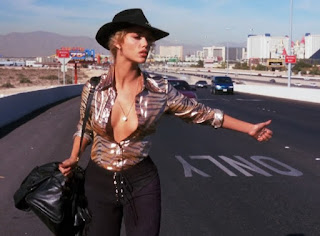One thing that gets lost amid all this quarantine is that major cities are seething hellholes. That's probably where I'm particularly drawn into the sort of neo noir films, where a hapless protagonist tries their best, but it seems the entire cities (usually NYC) are against them in every way. So, let's take a closer look at three of such examples.
Killing of a Chinese Bookie (USA, 1976)
Director: John Cassavetes
In the sweaty seventies, John Cassavetes was making his own minimalist art in between shoots of major big-budget Hollywood epics. He bled his own situation into his films, like here where an owner of a burlesque house (Ben Gazzara) strives to make art out of making middle-aged men horny.
He's also a gambling addict that gets into trouble with the local mob. The only way out is to do a favor, which in turn might suck out the last of humanity out of him. These kinds of films are basically tragedies about the failure of the American dream. The plucky underdogs dream of being big, but always have to face some harsh realities, and in the end, violence as well. Cassavetes didn't really like violence in films, so it's shot very discreetly, but the realities it causes changes the tone of the entire film.
Unlike the two other films in this list, this one is set in Los Angeles. It can be seen in the greater emphasis on cars, distances, and heat eminating from the entire film. Cassavetes as a director usually had a very limited color palette to his films, this one also looks like the film was overexposed in the sun, even though it's mostly set during the night.
The film is mostly talk and no action. One shouldn't expect it to even have a climax of sort. Cassavetes is interested in the implications of the situation more than anything. The entire thing also works as a metaphor for the corruption of the power of money. How far are you willing to sell your soul?
★★★★
After Hours (USA, 1985)
Dir. Martin Scorsese
It used to be thought that the 1980's weren't really that good for the director Martin Scorsese. I beg to differ, I find he did some great work that riffed on ideas and themes he had set up in the previous decade. After Hours is one of his rare more comedic movies. But in fact, it's a thorough New York movie that sees the city, yuppified since the days of Taxi Driver, as dangerous as ever.
A hapless office worker (Griffin Dunne) is a regular young man but takes a few steps out of his comfort zone as he's looking for love. Out in the middle of the night in a weird part of the town alone and with no money seems to attract him to oddballs and authorities that don't mean him well and are out to get him. The neon-lit, cold and smoky New York never looked better but at the same time, more terrifying.
The film is emphatethic towards everyone who's down and out in the Big Apple, even if it casts most of the characters of the city with major mental issues and cynicism. But the key is that circumstantial setbacks can pile up and minor things like losing a $20 bill may cause a chain-reaction that only adds to the plight of the outcasts. It's a film that also gets to the heart of the loneliness felt in cities, even if there are plenty of people around.
Scorsese has borrowed from Woody Allen a distrust of the city's intellectual and artistic class and mercilessly mocks it. He also manages to sneak in some of his personal obsessions, from late-night diners to talking about film classics to the mix as well, making this one of the movies surely influencing a young Quentin Tarantino. The only major problem with the movie is that it hits so close to truth it's not that funny as a comedy, but hey, you can't always have everything.
★★★★
Uncut Gems (USA, 2019)
Dirs. Benny & Josh Safdie
The latest one, and the one that particularly inspired this writing comes from the arthouse cinema production house A24 and has Scorsese and Cassavetes in particular as influences. The seediness in the previous ones is now contrasted with more modern sports centers and auction houses. But even if it's not done in the open any more, the threat of violence looms even stronger behind every scene.
Lando Calrissian -styled gems dealer Howard Ratner (Adam Sandler) is at once a sleazy little rat, and a fast-talking trickster you can't help but to like even if his self-destructive adrenaline addiction is putting not only himself, but his his family and friends on harm's way. Ratner is about to make a huge sell on a particularly beautiful opal, which puts him in a position and mindset to make increasingly dangerous bets on sports. The movie follows as Ratner ups the ante again and again, always surviving by the skin of his neck, until finally the bets become way too big to handle.
For the fast-paced modern audiences, the movie is fast-cut and has plenty of side-plots going on at all times. The effect may be anxiety-inducing for some viewers, but the film also warrants repeat viewings if one is interested in seeing the strings of plotlines getting pulled. Given the chance, Sandler can be a great character actor, so it's a bit sad he didn't get the rcognition he deserved from this which will surely make him go back to making very half-assed comedies with no effort. But such are the joys and victories that the film presents, too. They are fleeting, and something much worse is yet to come soon enough.
★★★★ 1/2





































